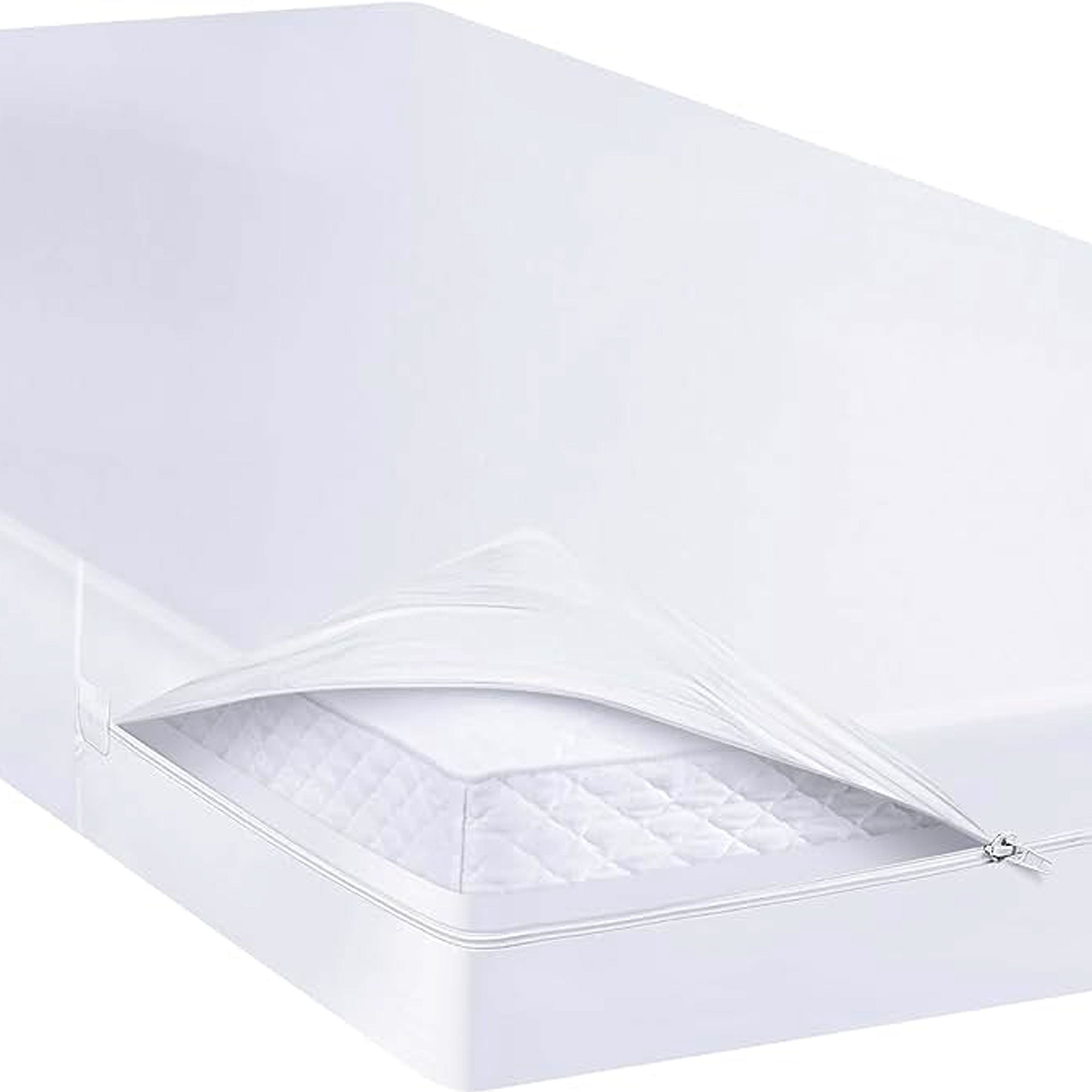This is how often you should wash your mattress protector - and it’s probably more than you’d think
We're betting yours isn't getting cleaned as often as it should be


Lauren Bradbury
There’s a high chance that your washing machine is constantly on the go, washing everything from your kids’ dirty school clothes to your bed sheets. You might even have a weekly washing machine rotation, but it’s important to know how often to wash a mattress protector to carve out some time for this bedroom essential, too.
As you might already know, the best mattress protectors are a welcome addition to any bedroom. Some are cooling, others are waterproof, and some can even keep dust mites and bed bugs at bay. But it’s safe to say that mattress protectors need a little maintenance if you want to make the most of these perks. And while knowing how to wash a mattress protector is vital, this task loses all of its value if you don’t do it as often as you should.
So, how often should you wash a mattress protector? We asked the experts for their advice, and you probably aren't washing it as often as you should - especially if you have pets in the house or like to drink water at night.

How often you should be washing your mattress protector
The beauty of a mattress protector is evident from the name. And as the experts at Simba tell us, ‘Mattress protectors prevent any damage to the top of the mattress.’ Of course, this can drastically improve how long a mattress lasts - but only if you look after the mattress protector.
Emma Rowlinson, Product Development Manager at bedding company Christy, explains that it's important to take care of your mattress protector if you want it to last as long as possible. She also revealed that the average lifespan of a mattress protector is around two years if you look after it well.
And part of that is cleaning the protector on a regular basis.
Emma explains that we should clean this item at least every other month to keep it hygienic. After all, mattress protectors are designed to protect from spills, sweat and other dirt that we don't want on our pricey mattresses.
Get the Ideal Home Newsletter
Sign up to our newsletter for style and decor inspiration, house makeovers, project advice and more.
'Generally, you should wash your mattress protector every other month,' she said. 'However, there are exceptions to this rule.’ Below, we outline those exceptions and what that means for how often you should wash a mattress protector.
- If someone in your house has been ill: If you regularly have guests sleeping over or just want to ensure your family members get rid of their illness quickly, you should wash the mattress protector as soon as possible. This will prevent the spread of illness, especially when the illness is transmissible, such as a cold or flu.
- If you have allergies: Although an air purifier can help with allergies, pollen, pet dander, and other pollutants can easily get caught in the fibres of a mattress protector. Therefore, if you suffer from allergies, you should wash your mattress protector once a month (or more).
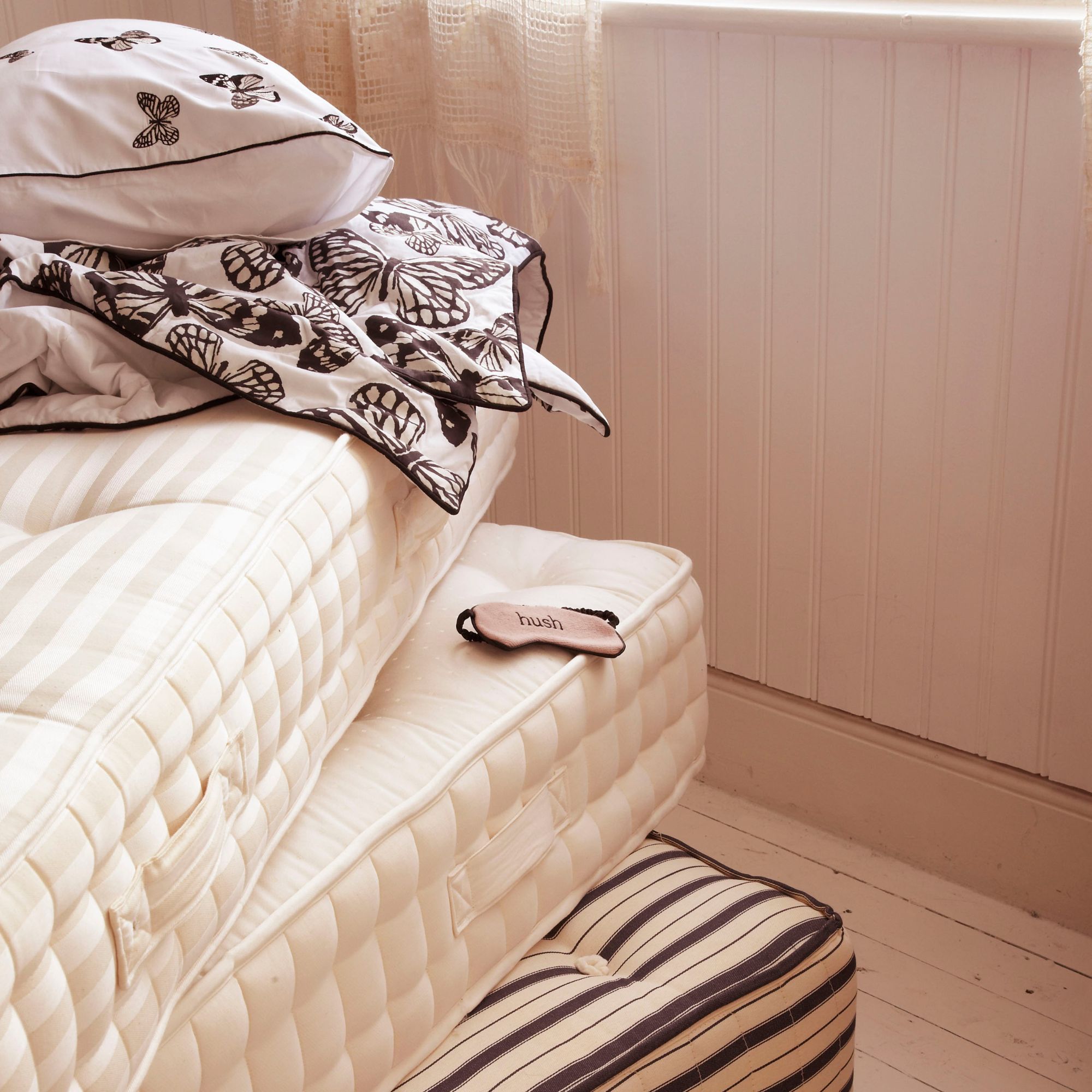
- If you spill something on it: Moisture and mattress protectors don’t mix, and something as simple as water spilling from your glass can lead to bacteria growth and even mould. This then becomes a breeding ground for dust mites and allergens, affecting your skin and the length of time your mattress protector lasts. So, wash it as soon as you spill something (or at least the morning after).
- If pets sleep on the bed: Mattress protectors get dirty enough with humans sleeping on it, so adding a pet into the mix makes it even dirtier. Because of this, you should aim to wash a mattress protector at least once a month - or more if your dog gets particularly mucky paws or you struggle with pet dander. You can also use one of the best vacuum cleaners for pet hair to suck up any stray hair.

When it comes to the best way to wash this household item, Emma also encourages you to check the details of your specific mattress protector - just as you would if you opt for a mattress topper instead of a mattress protector.
'Your mattress protector should have a care label, which will give you precise instructions on the conditions in which they can be washed. However, if yours does not, or it has faded, I’d recommend using regular detergent on a 40ºC gentle wash, as anything too hot can damage the protective qualities.'
She adds, 'And, if your mattress protector is stained, you will want to treat this beforehand. You can do this by using baking soda (a great natural cleaning hack) to work out the stains the same way you might with clothes.'
And when it comes to drying? Emma advises, ‘'While you can put mattress protectors in the dryer if you keep it to a low temperature, I suggest air drying them as heat can cause damage to the protective qualities.' To speed things up, you can use a heated clothes airer.
Just remember that mattress protectors should never be ironed or dry-cleaned. If you do either of these things, you may cause irreparable damage.
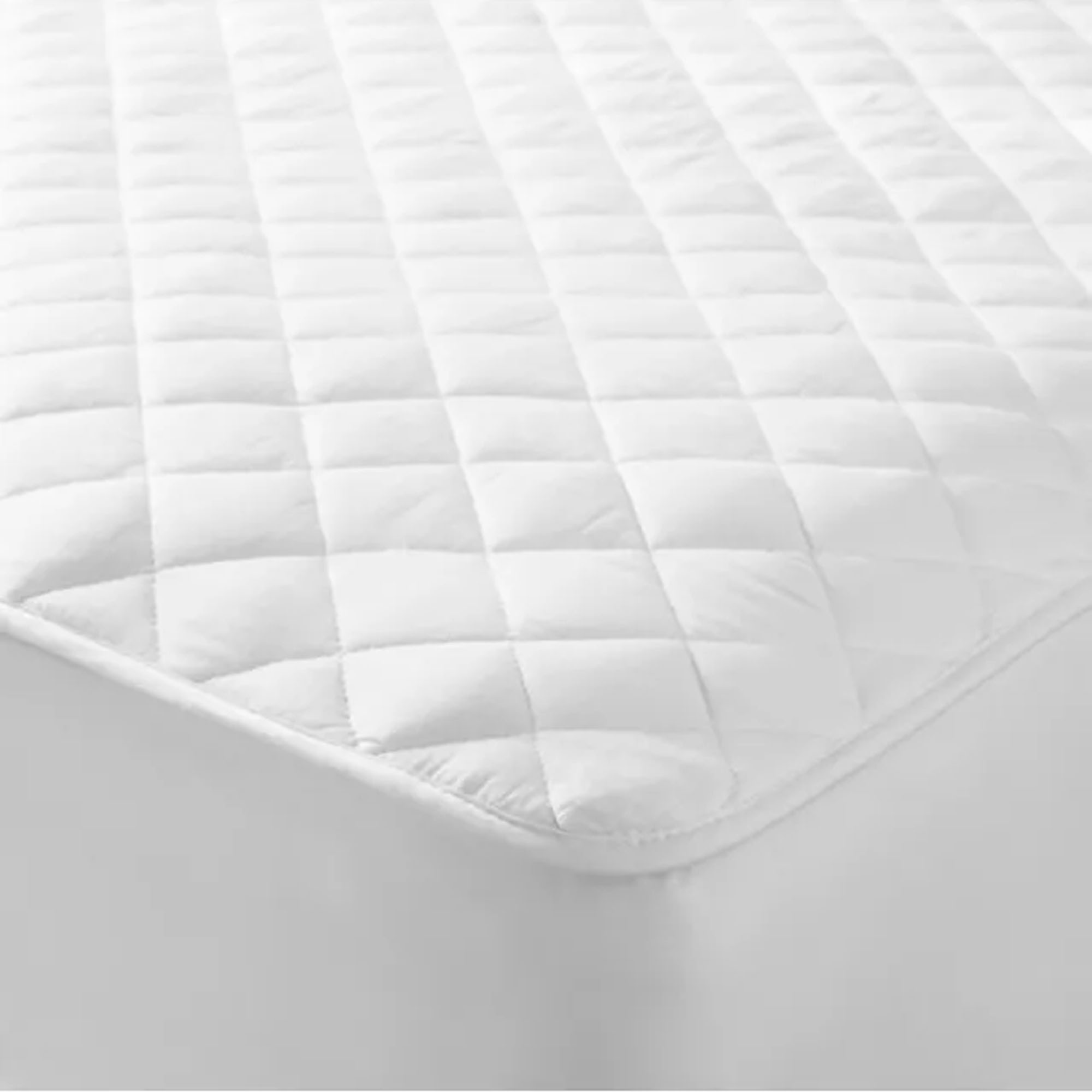
This is a great option if you're looking for a breathable cotton mattress protector. It comes in a wide range of sizes to suit every bed in your house and can be washed at 40°c.
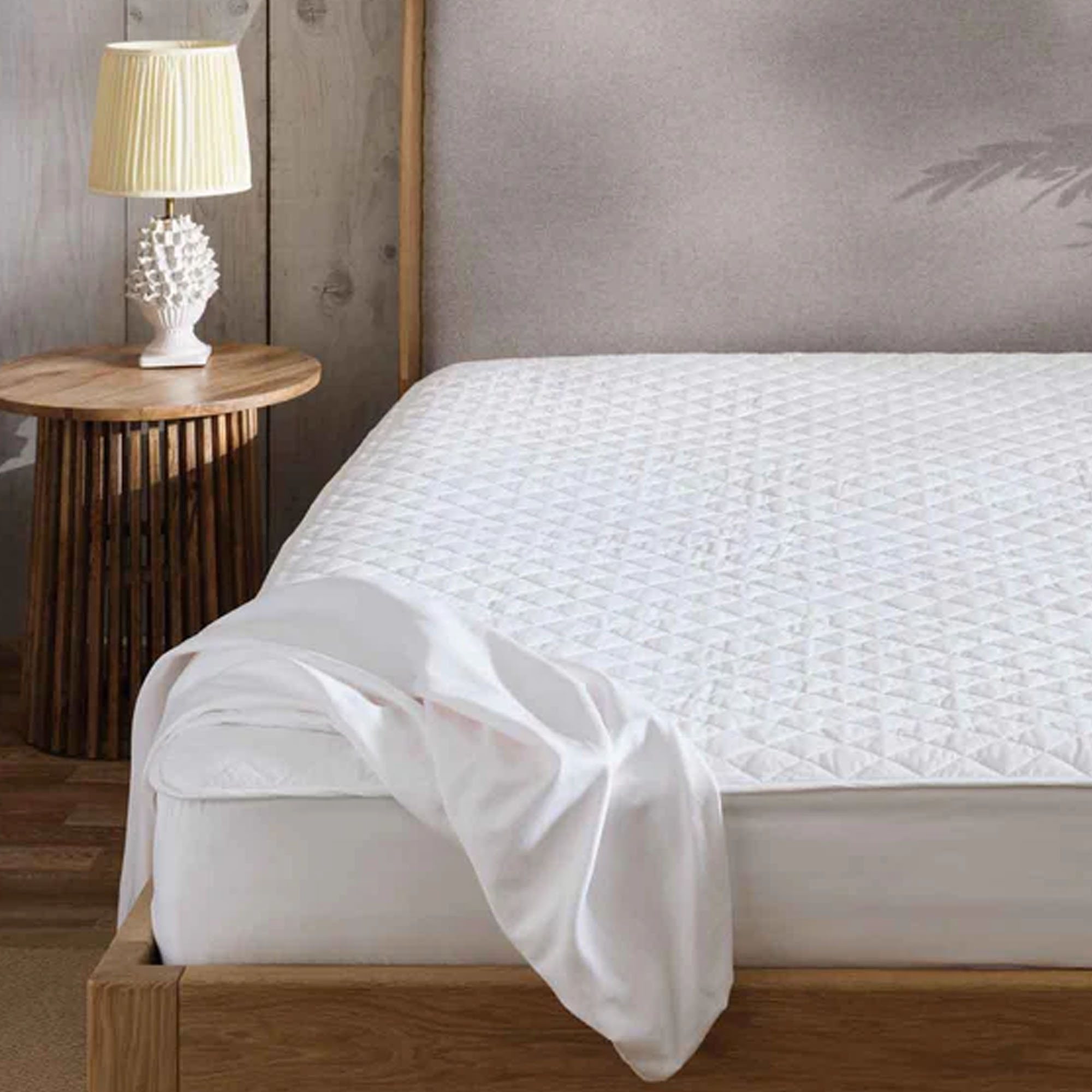
Scooms is one of the best places to buy bedding, and this extra-deep cotton mattress is perfect for those who also use a mattress topper. It can also be machine washed on a warm setting and tumble dried on low.
FAQs
What happens if you don't wash your mattress protector?
If you don’t wash your mattress protector, you may develop itchy skin, get bitten by bed bugs, or suffer from allergies. It will also shorten the lifespan of your mattress protector, meaning you’ll have to buy another one sooner than you’d like.
As a mattress protector sits on top of the mattress, not washing your mattress protector can also have a big impact on the mattress below. It can lead to staining and the transfer of dirt and oils, all of which can damage your mattress and force you to buy another.
Can you put a mattress protector in the washing machine?
Yes, you can put most mattress protectors in the washing machine. It’s always a good idea to read the label before doing this, though, as you may find that your mattress protector needs to be washed on a certain setting or temperature.
Failing to do this may also affect your warranty, so if you’re ever in doubt, always contact the manufacturer.
What is the lifespan of a mattress protector?
The average mattress protector should last between one to three years before it needs to be replaced. If you want it to last for three years, you need to take good care of it - and washing it regularly is the best way to do that.
Allowing moisture, dirt, and stains to penetrate your mattress protector will shorten its lifespan, so you should aim to wash it at least every other month (or more) to keep it in top form.
So, there you have it! That’s how often you should wash your mattress protector.

Amy Hunt is an experienced digital journalist and editor, now working in a freelance capacity specialising in homes and interiors, wellness, travel and careers. She was previously Lifestyle Editor at woman&home, overseeing the homes, books and features sections of the website. Having worked in the industry for over eight years, she has contributed to a range of publications including Ideal Home, Livingetc, T3,Goodto, Woman, Woman’s Own, and Red magazine.
- Lauren BradburyContent Editor (House Manual)
-
 Will a conservatory add value to your home and how can you maximise it?
Will a conservatory add value to your home and how can you maximise it?This is what the pros say
By Amy Reeves
-
 I’ve been looking for a new signature scent for my home and The White Company's new fragrance is the exact summer holiday smell I needed
I’ve been looking for a new signature scent for my home and The White Company's new fragrance is the exact summer holiday smell I neededSantorini smells fresh, summery and sophisticated
By Kezia Reynolds
-
 How to remove algae from garden walls in five steps – and the cleaning product experts rave about for tackling it fast
How to remove algae from garden walls in five steps – and the cleaning product experts rave about for tackling it fastExperts share their top tips for getting garden walls algae-free
By Katie Sims
-
 I’ve been looking for a new signature scent for my home and The White Company's new fragrance is the exact summer holiday smell I needed
I’ve been looking for a new signature scent for my home and The White Company's new fragrance is the exact summer holiday smell I neededSantorini smells fresh, summery and sophisticated
By Kezia Reynolds
-
 Should your doormat go inside or outside the front door? According to experts I've been getting it wrong for years
Should your doormat go inside or outside the front door? According to experts I've been getting it wrong for yearsExperts reveal the best spot for a a doormat based on your preferences and where you live
By Sara Hesikova
-
 IKEA has just launched a massive 96 new products - but these are the only pieces you need to pay attention to
IKEA has just launched a massive 96 new products - but these are the only pieces you need to pay attention toThe classic STOCKHOLM collection just got even better
By Kezia Reynolds
-
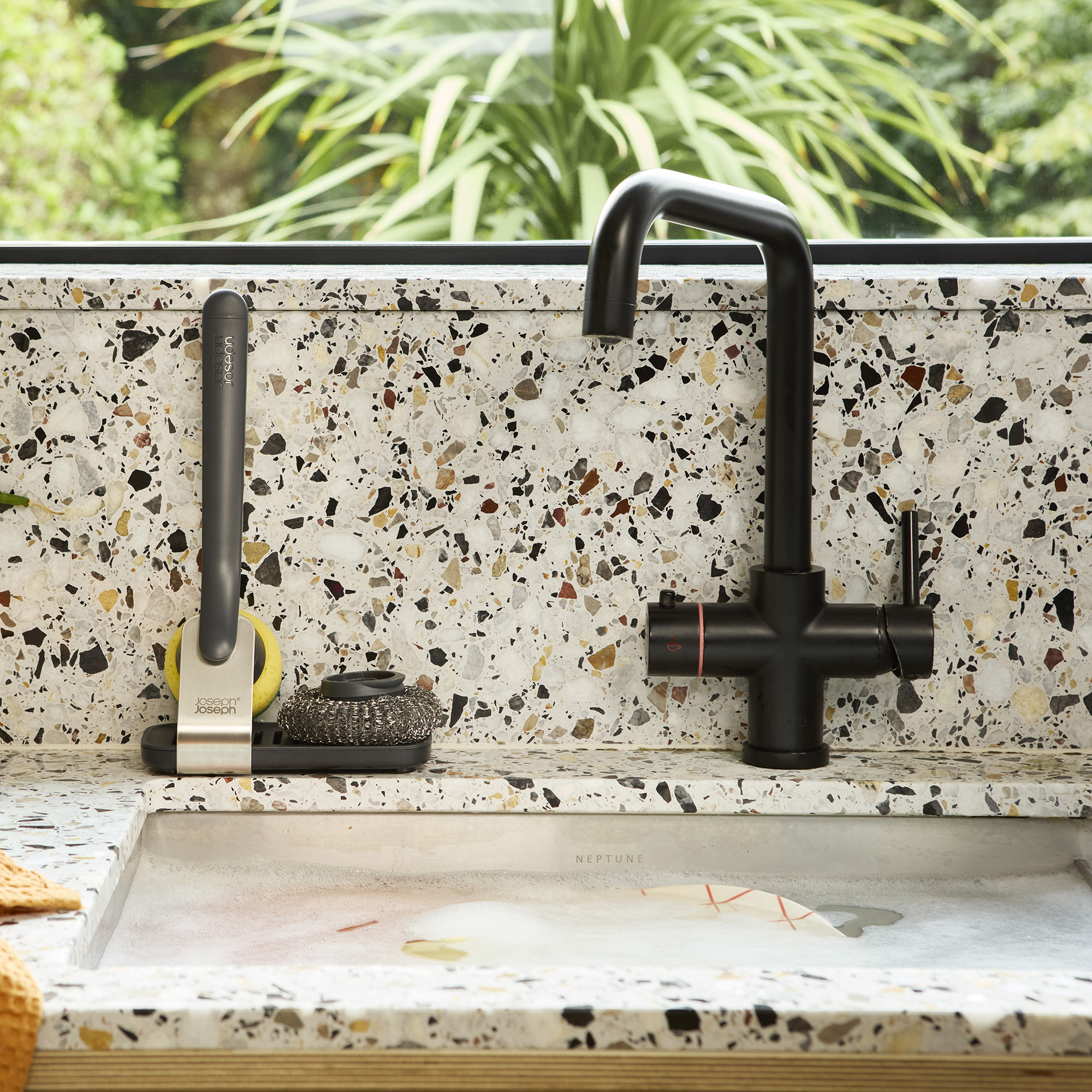 I finally got my hands on Joseph Joseph's genius Sink Tech range - my small kitchen sink has never looked so good
I finally got my hands on Joseph Joseph's genius Sink Tech range - my small kitchen sink has never looked so goodI didn't know stylish washing up accessories existed until I saw this collection
By Holly Cockburn
-
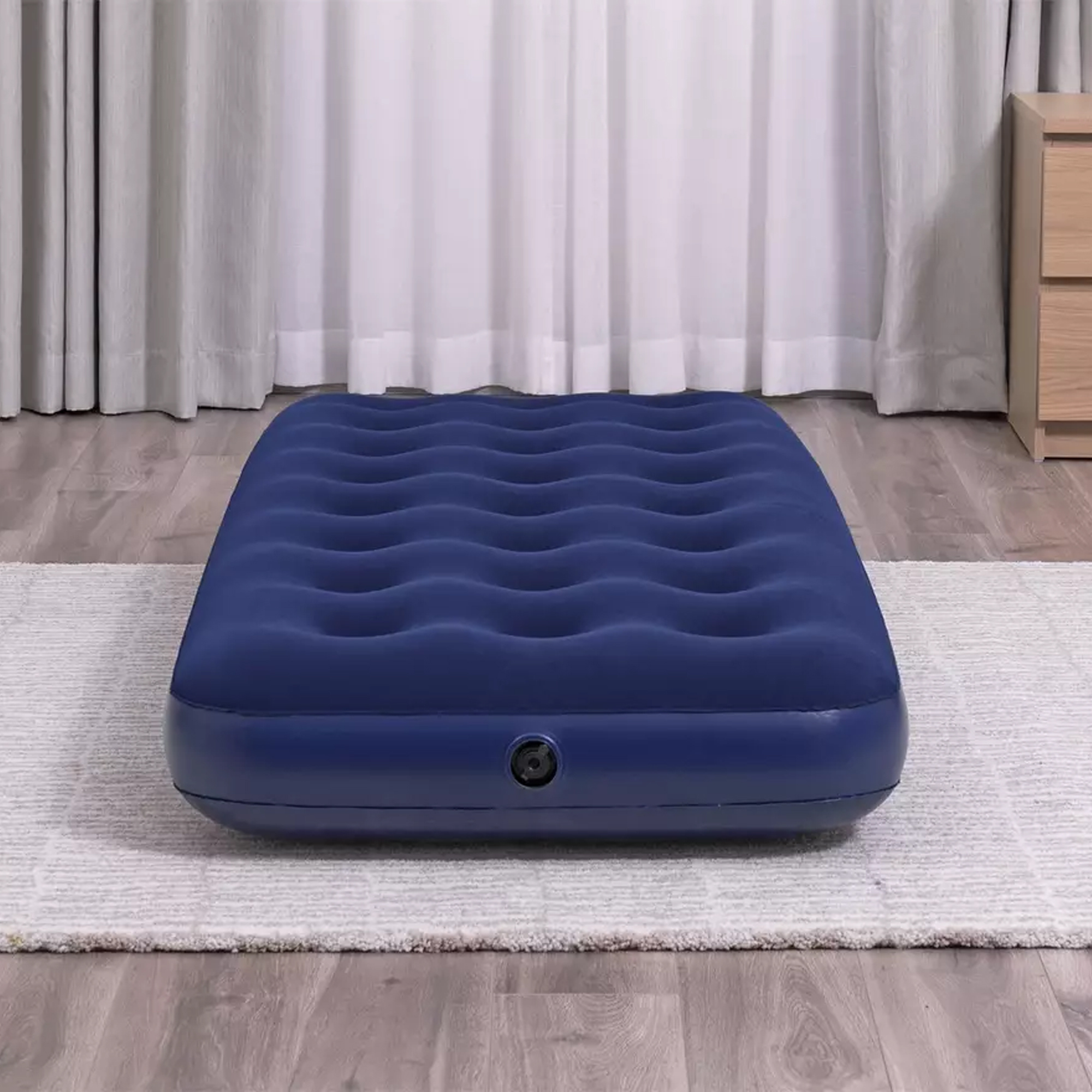 Argos is now selling an air bed for under £12 – if you're hosting guests this Easter Bank Holiday weekend, you'll want this sale on your radar
Argos is now selling an air bed for under £12 – if you're hosting guests this Easter Bank Holiday weekend, you'll want this sale on your radarThis 25% off sale is perfectly timed ahead of Easter weekend
By Amy Lockwood
-
 Rochelle Humes’ living room seating is ‘sofa goals’, and I found an almost identical high street alternative for under £1000
Rochelle Humes’ living room seating is ‘sofa goals’, and I found an almost identical high street alternative for under £1000You can now get the singer and TV presenter's modular sofa of dreams for less thanks to DUSK
By Sara Hesikova
-
 I finally got my hands on the sellout Morris & Co armchair from Habitat, and it looks even better in person
I finally got my hands on the sellout Morris & Co armchair from Habitat, and it looks even better in personIt's back in stock, and well worth the wait
By Rebecca Knight
-
 This is the new-but-vintage Le Creuset colour I wish I'd waited to buy my collection in – it's seriously covetable
This is the new-but-vintage Le Creuset colour I wish I'd waited to buy my collection in – it's seriously covetableFlamme Dorée is the brand's new limited edition colourway
By Molly Cleary
